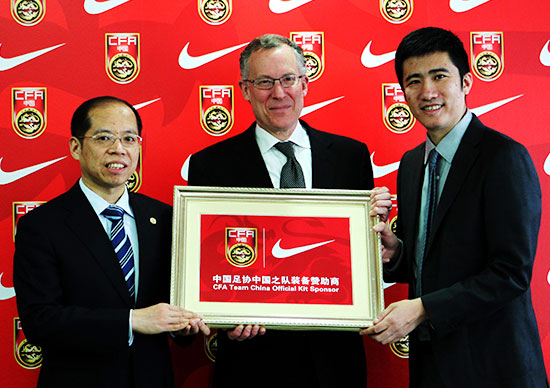Chinese viewers were glued to their sets for the final game of the AFC Champions League on November 21st, when Evergrande defeated the UAE's Al Ahli 1-0 in Guangzhou. Even the stories behind the clubs became more eye-catching than before.
The ticket price for the second leg of the final ranged from 600 yuan to 39,000 yuan, which was much higher than that of the finals of FIFA World Cup in Brazil. It is said that the match achieved an overall ticketing revenue of ¥200 million yuan.
What has caused this football fever in China? Some fans say, their inner passions are aroused as they watch the sport. Actually, Guangzhou Evergrande is the only Chinese team that excites them.
In contrast to the AFC champions, the Chinese national football team has been given the cold shoulder. On November 17th, they were tying with Hong Kong 0-0 at the half time in the 2018 FIFA World Cup Asian Zone Group C qualifier. The head coach Alain Perrin of France got quite upset while some Chinese reporters were even crying. Eight months after China had launched a plan for football development, the nation’s hopes ran aground again.
When a football team fails, the first victims are their sponsors, who have invested big money for more brand exposure. So it was no surprise that Adidas left the Chinese national football teams at the beginning of this year.
Fortunately, another sportwear brand, Nike, became the new official kit sponsor in a deal valued at more than ¥100 million RMB a year. Later, the Chinese football teams welcomed more sponsors like Changan Ford, Gionee, Hualu Baina and Skyworth.
Some analysts believe that Nike’s move is a long-term strategy. With the policy supports and the upcoming football reforms, Chinese football may be given more development opportunities. However, a sweet dream cannot meet the urgent demands of the present.
Adam Zhang, founder of Beijing Key-solution Sports Consultant Company, warns that sponsors should be wise to the current status of Chinese football. A well-established sponsorship plan must be based on the brand reputation and the long-term return on investment. Any misjudgement in sponsorship could lead to huge losses for a brand.
Source:Chinanews
Proofread by John Devlin
